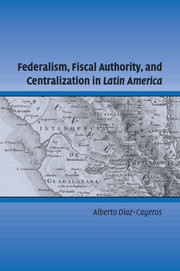Book contents
- Frontmatter
- Contents
- List of Figures
- List of Tables
- Preface
- Federalism, Fiscal Authority, and Centralization in Latin America
- 1 FEDERALISM, PARTY HEGEMONY, AND THE CENTRALIZATION OF FISCAL AUTHORITY
- Part I Fiscal Centralization in Mexico
- Part II Centralization and Revenue-Sharing in the Latin American Federations
- 6 VENEZUELA: UNITARIANISM IN DISGUISE
- 7 ARGENTINA: REGIME CHANGE AND FRAGILE CREDIBILITY
- 8 BRAZIL: THE RETENTION OF FISCAL AUTHORITY
- 9 CONCLUSION: STATE-BUILDING, POLITICAL INSTITUTIONS, AND FISCAL AUTHORITY
- References
- Index
- Titles in the Series
9 - CONCLUSION: STATE-BUILDING, POLITICAL INSTITUTIONS, AND FISCAL AUTHORITY
Published online by Cambridge University Press: 08 January 2010
- Frontmatter
- Contents
- List of Figures
- List of Tables
- Preface
- Federalism, Fiscal Authority, and Centralization in Latin America
- 1 FEDERALISM, PARTY HEGEMONY, AND THE CENTRALIZATION OF FISCAL AUTHORITY
- Part I Fiscal Centralization in Mexico
- Part II Centralization and Revenue-Sharing in the Latin American Federations
- 6 VENEZUELA: UNITARIANISM IN DISGUISE
- 7 ARGENTINA: REGIME CHANGE AND FRAGILE CREDIBILITY
- 8 BRAZIL: THE RETENTION OF FISCAL AUTHORITY
- 9 CONCLUSION: STATE-BUILDING, POLITICAL INSTITUTIONS, AND FISCAL AUTHORITY
- References
- Index
- Titles in the Series
Summary
This book has studied fiscal centralization and regional bargaining in the context of a century of political development in the Latin American federations. The general argument concerning the dilemma of fiscal centralization is relevant for many developing countries around the world. In this concluding chapter, I discuss the relevance of several insights drawn from the discussion of the Mexican and Latin American cases to substantive discussions in comparative politics. I sometimes make explicit comparisons between the Latin American federations and other developing countries. At other times, I discuss the research design that would be necessary in order to carry out an empirical validation of hypotheses. Finally, some of the issues I deal with belong to the realm of speculation.
I primarily address questions related to state-building and the construction of fiscal authority. This chapter is organized around the significance of the findings to the literature on nation-building, turning then to the political organization of fiscal structures and then to the political economy of federalism and the problems of regional compensation and redistribution.
Nation-Building
Perhaps the most fundamental issue this book has addressed, through the lens of the construction of national fiscal authority, is the problem of state-building. This topic has received renewed attention in the context of the “failed states” literature (Heldman and Ratner, 1993) and in the reconstruction of political authority in turbulent places such as Iraq and Afghanistan. The literature leans toward emphasizing the international aspects of state-building.
- Type
- Chapter
- Information
- Publisher: Cambridge University PressPrint publication year: 2006



